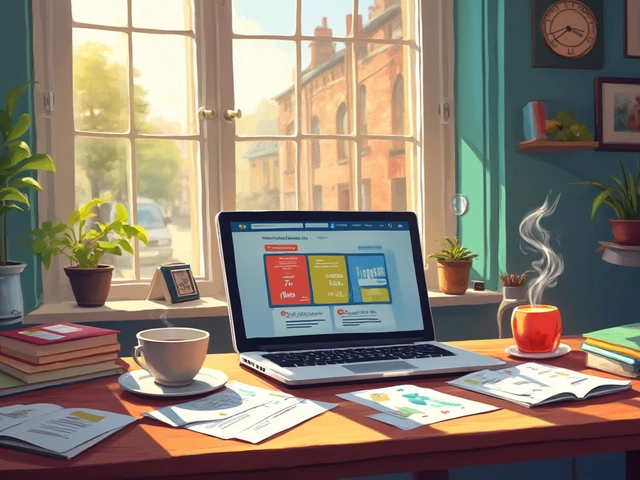Diving into the world of web development might seem intimidating, especially if numbers and complex equations aren't your strong suit. If you're wondering whether your pathway will be barred due to your discomfort with math, you're in luck. Math, while a skill of unquestionable value, isn't the heart and soul of becoming a successful web developer.
The journey of coding involves embracing creativity, honing problem-solving skills, and having a knack for logical thinking. Most of the tasks you will encounter as a web developer will not necessitate the use of advanced mathematics. Instead, your focus will be on learning languages like HTML, CSS, and JavaScript, and understanding how they work together to create functional and visually appealing websites.
- Understanding Web Development Requirements
- Dispelling the Math Myth
- Essential Skills for Aspiring Developers
- Learning Tools and Resources
- Real-World Success Stories
Understanding Web Development Requirements
Embarking on a journey to become a web developer might initially seem daunting, especially if you're haunted by the illusion that mastering complex math is a prerequisite. The world of web development, unlike what many assume, is not merely a labyrinth of numbers and algorithms. It welcomes diverse skills that cater to creativity, problem-solving, and a capacity for learning technical languages. This field operates on logic and structure and what truly matters are your ability to think algorithmically and the knack for identifying patterns in data. Many successful developers often emphasize that their roles focus more on problem resolution and logical thinking than complex mathematical computations. For those worried about lacking in maths, know that this industry values your ability to engage with ideas and translate them into functional realities.
When it comes to math skills, most roles in web development require fundamental understanding rather than advanced wizardry. These basics include grasping logic, understanding how algorithms work, and occasional use of arithmetic for tasks like simple data analysis. The core of web development relies on proficiency in languages such as HTML, CSS, and JavaScript, each serving distinct purposes in the ecosystem of the web. HTML lays the fundamental framework of websites, structuring content, while CSS breathes life through design and style. JavaScript introduces interactivity, enabling the engaging, user-friendly websites we frequently interact with today. Proficiency in these languages is crucial and often comes incrementally with practice and exploration.
"Success in web development depends more on understanding how to communicate with computers than understanding mathematical theories." — Mark ZuckerbergThe landscape of web development is constituted of front-end, back-end, and often a mix known as full stack development. Aspiring full stack developers engage with both client-side and server-side development, diversifying their skill set to encompass full-product realization. These roles demand the versatility to toggle between designing engaging digital experiences from a user’s perspective and then flip the situation to develop a robust server architecture that supports scalability and efficiency. The beauty of this field is the wealth of resources available to nurture every skill level—from beginners learning the ropes to seasoned professionals aiming to refine their craft.
A significant trend today is the evolving focus on teamwork and collaboration. Web development projects seldom rely on individual skills alone but rather thrive through collaborative efforts among teams of developers, designers, and strategists. This collaborative environment thrives on effective communication and the ability to work seamlessly with disparate team members and stakeholders. Listicles, for instance, prove invaluable in identifying not just hard skills like coding but also soft skills such as teamwork and time management that are pivotal in the realm of web development. Instead of being bogged down by the myth that math is indispensable, channel your energies into becoming a collaborative thinker who can contribute effectively to your team’s vision.
Perhaps what surprises many newcomers to this world is the extensive use of open-source tools and frameworks that drastically simplify development tasks. Programming without a reliance on complex floating-point maths is feasible, thanks to the resources provided by communities like GitHub and Stack Overflow. This trend towards open-source collaboration highlights a shift where understanding the nuances of community-driven libraries and frameworks empowers developers to focus on creativity and innovation. Again, we witness a resonating truth in the industry: the qualities pursued are adaptability, a passion for learning, and the courage to consistently step out of one's comfort zone.
Dispelling the Math Myth
For many aspiring web developers, there's a lurking misconception that substantial math prowess is a prerequisite to carving their niche in the tech world. This persistent myth can be traced back to the early days of computer science, where advanced mathematics played a significant role in programming. However, modern programming languages and web development tools have evolved substantially since then, liberating developers from the fear of needing to solve complex equations to craft websites and apps.
Contrary to popular belief, the typical responsibilities of a full stack developer involve tasks that prioritize logical reasoning, creativity, and systematic problem-solving over purely mathematical challenges. While foundational math skills such as understanding algorithms or basic arithmetic might occasionally come in handy, they rarely dominate the daily grind of coding. The real essence of web development lies in understanding how different pieces of code collaborate to form functional and aesthetically pleasing digital interfaces.
Many successful developers have thrived without relying heavily on math beyond basic algebra or geometry. Their journeys can be traced to a combination of curiosity, persistence, and a willingness to continuously improve. Emphasizing API integrations, practice in languages like Python or JavaScript, and familiarity with frameworks such as React or Angular become more critical tasks than crunching numbers. This shift in focus from calculus to creativity within code has unlocked doors for individuals who might previously have felt excluded from this dynamic field.
It's worth highlighting that three out of four tech employers look for candidates' problem-solving abilities and creativity over strict academic qualifications, including math, underscoring the changed landscape of developer expectations. As the demand for web-based solutions continues to surge, opportunities are burgeoning for those who can bring a fresh perspective to development challenges without excessive focus on math.
"Programming is about understanding and making things work — it's like a puzzle rather than a math problem," shares renowned software engineer, John Resig, creator of jQuery. His sentiments reflect a widely held belief in the development community, emphasizing that web development is accessible to a broader range of talents than once believed.
Transitioning from this myth-laden mindset means embracing the tools and platforms that streamline the development process. With abundant online resources, from coding bootcamps to interactive platforms like Codecademy and free resources like W3Schools, the path to proficiency is clearer and less intimidating. Remember, the journey to becoming a web developer is far more about determination and a passion for technology than about acing math tests.

Essential Skills for Aspiring Developers
Embarking on the journey to become a web developer doesn't hinge solely on your expertise with numbers. There are a myriad of skills that are far more integral to the role. At the core, web development is about creating and building. This means it requires a sharp mind for coding languages. Mastering programming involves learning key languages like HTML, CSS, and JavaScript. These are your bread and butter. HTML is the backbone, dictating the structure of web pages. CSS then styles these structures, while JavaScript breathes life into them, enabling interaction. Together, these languages form the trifecta of foundational skills every web developer must possess.
Beyond these technical skills, an ability to think logically and approach problems with a solution-oriented mindset is crucial. Coding is often perceived as a methodical form of solving puzzles. Each segment of code you write builds towards solutions, requiring you to analyze and troubleshoot efficiently. An innate curiosity about how things work and a desire to deconstruct problems are traits that should be nurtured. It is this curiosity that drives a developer to stretch beyond basic tasks and tackle more complex, layered challenges. This is where passion for building things, digital in nature, meets the intellectual exercise of solving challenges at a detailed level.
A strong sense of design is equally vital. While some may argue that design is a separate discipline, understanding design principles helps create websites that are not only functional but also aesthetically pleasing. Knowing what makes a user experience seamless, intuitive, and enjoyable creates web applications that stand out. Given the global nature of the internet, there's also flexibility required in being able to adapt designs to suit different cultures, operating systems, and devices. Developers should stay completely informed about current trends in both technology and design to maintain relevant skill sets.
Let's not overlook communication skills. You might wonder what this has to do with coding, but effective communication is about more than just words. In the context of development, it's the ability to translate complex technical concepts into understandable ideas for clients and team members. Collaborating with designers, marketers, and managers requires you to express your thoughts clearly. Whether you're working in a large company or a startup, your ability to convey the potential and limitations of your projects is invaluable. Steve Jobs once said,
"Great things in business are never done by one person. They’re done by a team of people."Communication enables that cooperation, turning individual efforts into cohesive outcomes.
Let’s not forget the tools and platforms that assist developers daily. Version control systems like Git are paramount for keeping track of changes made to code over time. If you make a mistake somewhere along the line, these tools allow you to step back, potentially saving countless hours of trouble. Many companies also operate within frameworks like Node.js or libraries such as React, tools that provide templates and functions to streamline the development process. A solid understanding of these can dramatically improve productivity and efficiency. As time progresses, the tech landscape continuously evolves, making adaptability and a penchant for learning crucial attributes for aspiring developers. A determination to stay updated with these tools and trends solidifies a developer’s skill set and relevance in a swiftly advancing industry.
Learning Tools and Resources
Embarking on your journey as a web developer requires equipping yourself with the right set of tools and resources. There's a plethora of options available that cater to different learning styles and preferences. Online platforms like Codecademy, freeCodeCamp, and Udemy have become popular go-tos for budding developers. These platforms offer comprehensive courses on various programming languages such as HTML, CSS, and JavaScript, making them invaluable resources for those new to coding or looking to advance their skills.
In addition to structured courses, consider engaging with coding communities. GitHub, for instance, is not only a place to store your code but also a treasure trove of collaboration with other developers. Here, you can contribute to open-source projects, a practice that not only refines your coding skills but also lets you understand collaborative coding mechanics. Using GitHub helps in understanding version control systems, an essential component in professional development environments.
Books and online documentation are gold mines for those who prefer self-paced learning. Titles like “Eloquent JavaScript” and “Learning Web Design” break down complex concepts into digestible pieces, perfect for learners at any stage. The Mozilla Developer Network (MDN) provides reliable documentation on web technologies, regularly updated to reflect the latest industry standards. This makes it an unmatched resource for tackling specific queries or deepening your understanding of particular features.
Another essential tool in your learning arsenal is project building. By conceptualizing and creating your own projects, you gain practical experience that textbooks and courses alone can't provide. Start small with projects like building a personal website or creating simple applications using HTML, CSS, and JavaScript. As you grow more comfortable, challenge yourself with more complex projects, integrating APIs or exploring frameworks like React or Angular.
It's crucial to remember the most potent tool in a programmer’s toolkit: persistence. The software development landscape constantly evolves, meaning continual learning is an integral part of being a developer. Embrace the challenges and rest assured that seeking help isn't a sign of weakness. Instead, it signifies your commitment to growth. A famous quote from Steve Jobs states,
"Everyone in this country should learn to program a computer, because it teaches you how to think."Armed with these tools and the right mindset, anyone can climb the ladder from novice to proficient developer.

Real-World Success Stories
Many people have achieved remarkable success in the field of web development without letting their limited math skills hold them back. One inspiring example is Chris Wanstrath, co-founder of GitHub, who began his journey as a self-taught programmer. GitHub has become a vital platform for developers around the world yet Wanstrath himself admits that he was not the strongest math student during his schooling years. Instead, his success came from his passion for coding and problem solving, as well as his ability to collaborate effectively with other developers. His story illustrates that being a top-level web developer is more about creativity and determination than excelling at math.
Another compelling story is that of Sara Soueidan, a Lebanese front-end web developer and speaker, who is renowned for her work in creating accessible web interfaces and SVG animations. Despite the common misconception that developers need to excel at math to handle such technical tasks, Sara has proved that a strong visual sense and an eye for detail can be just as important. Through self-learning and a proactive approach to problem-solving, she has garnered respect in the industry while contributing significantly to the web development community.
In an interview, Steve Jobs once said, "Everyone in this country should learn how to program a computer because it teaches you how to think." This quote highlights the essence of what web development is truly about: critical thinking and logical reasoning skills, not just numbers and equations.These skills are the core of what makes a full-stack developer effective, highlighting why basic math knowledge is all that is necessary to excel in this field.
Additionally, we can look at the journey of David Karp, the founder of Tumblr, who didn't complete formal education in computer science. Karp has openly discussed his challenges with traditional education and math, yet he pursued web development with great zeal. Under his leadership, Tumblr grew into a platform hosting millions of blogs and became a defining space on the internet. His story serves as a significant endorsement that passion and practical knowledge often surpass any theoretical emphasis on math when it comes to achieving success as a developer.
These stories collectively demonstrate that while math might help in specific scenarios, it is not a barrier to entry in pursuing web development. The industry comprises numerous stories of people from diverse backgrounds who have thrived by focusing on creativity, user experience, and community engagement. By leveraging unique perspectives and diverse talents, they have enriched the digital landscape. For aspiring developers worried about their math skills, these success stories offer a beacon of hope. Embrace the skills you do have, remain curious, and understand that learning is a lifelong journey. With determination, you can add your own chapter to the rich tapestry of web development triumphs.





